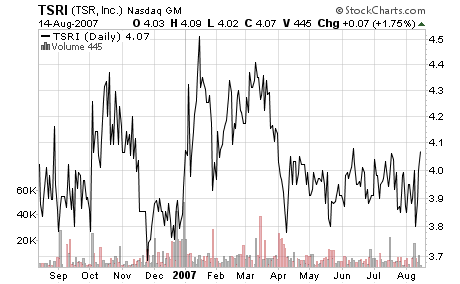You heard it here first, although if you have read the company’s SEC filings it would be obvious. First, I should state that I am not an impartial observer of the company and of the failings of its management. I have been a shareholder for a few months and I intend to remain a shareholder for some time. I bought into the company well aware of the management’s failings, but believing that the company would easily be worth 50% more than I paid should management suddenly get fired. That is not a strategy I recommend unless you are a hedge fund with the money to buy a large stake in a company. I have been burned once before with this strategy, with Career Education [[CECO]], which I bought during a shareholder’s proxy fight against management that he ultimately lost (and I lost money on that).
Regent Communications, trading around $3 currently, [[RGCI]] is a small radio company with radio stations in a number of ‘mid-market’ cities, such as Buffalo, New York. The company aims to have a number of stations in each of its markets so that it can spread out fixed costs over greater revenue. The company’s stations have eked out small increases in revenues over the last few years, despite the tough advertising market. The company increased its size last year by buying a number of stations from ABC radio. Regent Communications trades at a very modest P/CF (price to cash flow) ratio of 10.9 on a trailing twelve months basis.

So what is wrong with Regent management? For starters, they are paid too much for what they do: $670k and $500k last year for the two top executives (see the 2006 proxy for details). While that does not seem like much, that includes substantial bonuses in a year in which the company’s stock price nose-dived by 40% and operational improvements were minor. Also, keep in mind that radio is not a business where the top executives need to do much–all they really do is decide on a few broad initiatives and allocate capital. The station managers could easily do their jobs autonomously.
Oh, and with regards to allocating capital, Regent is horrible. The company bought back loads of stock at much higher prices in 2005 and 2006. Then it took on loads of debt to buy new stations last fall. Even as the stock price was falling the company stopped buying back more stock. The company generates strong and stable cash flows, and is in a mature industry, yet it pays no dividend.
I am not the only one disappointed with Regent’s management. One hedge fund, Riley Investment Management (which holds or controls 7.4% of RGCI), tried to call a special meeting to elect new directors. The company blocked the move. So earlier this week, Riley filed suit against Regent because Regent would not provide it with a list of shareholders or allow it to call a special shareholders meeting for the purpose of electing new directors. You can see Riley’s original letter to Regent dated July 19, 2007. The company’s charter allows for 20% of shareholders to call a special meeting of shareholders, and Riley asserts that it and several other shareholders easily
Just yesterday (August 15, 2007), Regent Communications filed a lawsuit against the hedge funds that are suing it–Riley Investment Partners Master Fund, L.P. and Riley Investment Management LLC, (collectively “Riley”) and SMH Capital Inc. (“SMH Capital”). While I have no clue as to the legal validity of Regent’s claim, it is obvious that this is an attempt to prevent Riley from calling a special shareholder’s meeting and getting a list of all shareholders.
I hope that the directors suddenly remember their fiduciary duty to shareholders and fire management and then began a liquidation of the company. An orderly liquidation of the company could easily bring $4.50 or more per share to shareholders. This was first proposed by Riley back in April (see their letter at the end of their 13d filing), but the company ignored them. If Riley has to win in court to get their director nominees elected and to get the company sold or liquidated, the legal costs could erode some of Regent’s value.
Disclosure: I hold RGCI stock. My disclosure policy makes for good reading.

